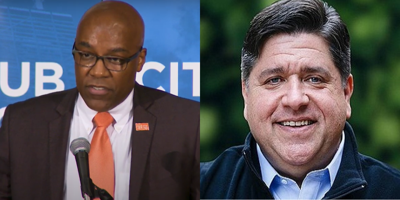
Illinois Attorney General Kwame Raoul and Gov. JB Pritzker
CHICAGO - A new Illinois state "workplace privacy" law threatens employers with state regulatory actions, lawsuits and fines if they don't follow a series of stringent new state rules when using the federal E-Verify system to screen out illegal immigrants not authorized to work in the U.S.
But those threats of state action don't necessarily mean Illinois state lawmakers are actually trying to discourage employers from using E-Verify, as federal law explicitly allows, Illinois state lawyers have told a federal judge.
And those state lawyers said that means the federal government shouldn't be able to sue the state of Illinois over what the Trump administration has called a sly attempt by Illinois Democrats to continue try to thwart federal immigration enforcement efforts in the state.
"... Congress chose not to require employers to participate in the E-Verify program," wrote Darren Kinkead, an assistant Illinois Attorney General, on behalf of Illinois Attorney General Kwame Raoul, in a brief filed in support of the state's request to dismiss the Trump administration's lawsuit.
"The only available inference is that Congress thought E-Verify was not necessary to achieve its goal of eliminating unauthorized employment.
"... The Supreme Court has made clear that 'in the vast majority of cases where federal and state laws overlap,' allowing states to enforce their laws 'is entirely consistent with federal interests.' The federal government has not shown that a longstanding state law requiring employers to take basic steps to prevent undue harm to employees from misuse of E-Verify somehow qualifies as the rare exception to this rule."
That lawsuit comes about a year since Democratic lawmakers who dominate Springfield and quietly passed the legislation, officially docketed as SB0508. Democratic Gov. JB Pritzker signed the legislation into law last August.
The law took effect at the beginning of 2025.
The new law affects employers' ability to use the E-Verify system when determining if job applicants or current employees have the legal ability to work in the U.S.
The wording of the law and its likely effects have led critics of the legislation, including the Justice Department under President Donald Trump, to blast the law as a clever attempt to continue shielding illegal immigrant workers and complicating federal immigration enforcement in Illinois.
"By imposing confusing rules during the employment verification process and threatening employers with penalties if they do not comply, SB0508 discourages and complicates the use of E-Verify and Form I-9 inspection requirements," the Justice Department wrote in a release announcing the lawsuit.
The federal action against the Illinois law has been anticipated by many since the law was enacted, over the warnings of employment lawyers that the new law essentially means Illinois was again attempting to severely discourage, if not outright prohibit, the use of E-Verify by employers seeking to screen out illegal immigrants and protect themselves against federal immigration workplace enforcement actions.
Critics of the law said it effectively sets up a "Catch-22" for Illinois employers, under which employers could be forced to choose to follow federal or state law, and then face devastating government-ordered financial penalties, no matter which option they chose.
Should employers choose to follow federal law, the state could penalize them. But if they opt to abide by state law, they faced the risk of penalties from the federal government.
Under federal law, every employer in the U.S. is allowed to use the E-Verify system, operated by the U.S. Citizenship and Immigration Services, to screen job applicants and workers to determine their eligibility to work.
Federal law requires employers to verify their workers are legally authorized to work. Employers who knowingly hire illegal immigrants or others without proper documents or work authorization could face massive and potentially business-threatening penalties.
These can include fines of $3,000 per worker if federal immigration and labor officials establish employers failed to verify I-9s, and penalties of $16,000 per worker if it is determined they knowingly hired those ineligible to work in the U.S.
Employers can also face jail time.
However, under the language added to the Illinois workplace privacy law by SB0508, employers in Illinois would be forbidden from imposing "work authorization verification ... requirements greater than those required by federal law."
The state law requires employers to provide at least seven days notice to workers before immigration or labor officials inspect the federal I-9 work authorization forms the company is required to keep on file for its workers.
And the law forbids employers from taking any "adverse employment action" against a worker, even after learning of a potential violation, until the Social Security Administration or the Department of Homeland Security provides the employer with a "final notice" that they cannot confirm the worker is eligible to work legally in the country.
On the Illinois Department of Labor website, the state explicitly tells employers in a FAQ about SB0508 that the law doesn't forbid them from using E-Verify. But the state DOL simultaneously warns employers who use E-Verify that they could face significant penalties, lawsuits and enforcement actions unless they "follow the requirements of the Right to Privacy in the Workplace Act."
Employers who are accused of violating the law could face lawsuits from workers and enforcement actions from the Illinois Department of Labor. Penalties could run up to $5,000 for a first violation and up to $10,000 for later violations.
However, in response to the Trump administration's lawsuit, the Illinois Attorney General's office asserted the Trump administration can't prove the state law actually will interfere with employers' ability to use E-Verify and thus serve to frustrate federal workplace immigration enforcement.
They asserted that the Justice Department's claims that the threats of state fines and lawsuits against employers who allegedly "misuse" E-Verify would discourage Illinois employers from using E-Verify in the first place amounts to only a "hypothetical conflict based on rampant speculation."
"The federal government maintains records on E-Verify usage; it would know if the state law was causing Illinois employers to flee the program and could establish it with evidence—or allege it with certainty," the state taunted in its brief.
"That it hasn’t even tried should tell the Court all it needs to know."
That assertion, however, did not include any further discussion on how many enforcement actions the state may have launched against employers in the six months since the law took effect or if the state will take any enforcement actions against employers while the federal lawsuit remains pending.
In the brief, the state further argued the Justice Department has mischaracterized the law as an attempt to protect illegal immigrants. Rather, Raoul's office claimed the law was intended to protect American citizens and immigrants legally authorized to work in the U.S. from being falsely identified as illegal immigrants.
So, Raoul claimed, the law is not an attempt to interfere with or usurp federal immigration enforcement.
In passing the law, SB0508's chief sponsor State Sen. Javier Cervantes, D-Chicago, said the state law was intended to "protect marginalized workers from unfair enforcement action during their employment."
Employment lawyers who analyzed the measure, however, said the law does more than just protect workers against "bureaucratic errors," as Cervantes claimed.
As early as the fall of 2024, employment lawyers were warning employers that the new law would make it next to impossible for virtually all Illinois employers to use E-Verify and could effectively ban them from doing so, unless they wish to risk enforcement actions, fines and lawsuits under the state law.
The Justice Department's new lawsuit marks the second time in the last two decades that Illinois and the federal government have clashed in court over Illinois Democrats' efforts to limit or restrict the use of E-Verify.
In 2007, Illinois Democrats passed legislation prohibiting Illinois employers from using E-Verify. At the time, Democrats said they had concerns over the accuracy of the E-Verify system. Under that law, employers in Illinois were barred from using E-Verify until the federal government could show the system returned confirmed and accurate information over 99% of the time.
That law, however, was struck down by a federal judge in 2009, after the federal government sued the state because the state didn't have the authority under the U.S. Constitution's federal supremacy clause to stop employers from using a system specifically authorized by federal law to attempt to ensure they were acting in compliance with federal immigration and labor laws.
The new lawsuit comes on top of a lawsuit brought earlier this year by the Trump DOJ against the state and governments of Cook County and the city of Chicago over their so-called "sanctuary" or "welcoming" laws, ordinances and policies. That action took aim at provisions in those laws and ordinances which generally forbid local and state police from cooperating with federal immigration enforcement efforts.
In that lawsuit, the Justice Department asserts state and local officials are using their local laws to effectively thumb their noses at federal immigration law while shielding illegal immigrants.
That legal action also remains pending in federal court.
In its new legal action, the Justice Department again argues Illinois has trespassed unconstitutionally on the authority of the federal government and is interfering with the ability of employers to ensure their workforces and hiring practices are in compliance with federal law.
The Justice Department has not yet responded to Illinois' attempt to dismiss its lawsuit over SB0508 and Judge Coleman has not yet ruled in the matter.
Judge Sharon Johnson Coleman was appointed to the bench by former President Barack Obama.


